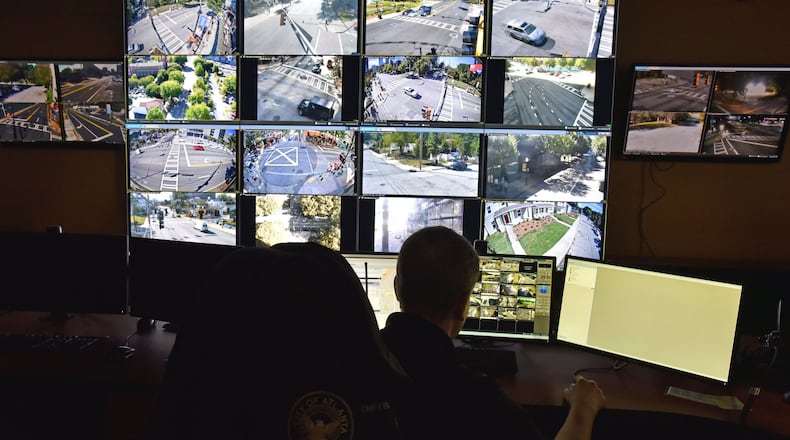Whoever boosted a white Kia Optima the other day didn’t joyride long. The next morning, the car rolled by a license plate reader somewhere in the city and triggered an alarm in downtown Atlanta.
Atlanta Police Department Officer Antwoin Williams, seated in front of a giant wall of monitors with smaller ones on his desk, scanned the screens and gripped his radio, relaying information to colleagues patrolling the streets. Before officers caught up to the Kia it came to a quick stop, its temporary occupants scattering. There were no immediate arrests, but at least the car was recovered.
“It happens all the time,” Williams said.
For eight years, he has been assigned to Loudermilk Video Integration Center in downtown Atlanta, where officers keep virtual watch over Atlanta through security cameras posted in and around busy intersections, parking lots and garages and elsewhere.
“This is one of the better crime-fighting tools,” said Williams, who has seen not only stolen cars cruising around town but also carjackings, shootings and fatalities over the years. “It’s real-time crimefighting.”
RELATED: Delta increases use of facial recognition scanning
RELATED: Meet the new neighborhood watch — license-plate reading cameras
Through Operation Shield, as it’s known, officers are able to view footage captured by its own cameras as well as privately owned devices whose owners have opted to link their systems to the city’s. The Atlanta Police Foundation, which supports the center and other crime-fighting initiatives through private donations, says crime has been reduced by 20 to 50 percent in areas where cameras have been placed.
When the initiative was announced in September 2011, authorities had access to about 100 public and private cameras. Today it’s around 11,000, a feat that has Atlanta near the top in a study of cities using security footage.
“Eight out of the top 10 most-surveilled cities are in China,” the summary of key findings from the technology research firm Comparitech reads. “London and Atlanta were the only cities outside of China to make the top 10.”
Ratings reflect each city’s estimated number of cameras per capita. Atlanta ranked just below Beijing, although the Chinese capital eclipses us exponentially with an estimated 800,000 cameras.
“Depending on whom you ask, the increased prevalence and capabilities of CCTV surveillance could make society safer and more efficient, could trample on our rights to privacy and freedom of movement, or both,” the study said. “No matter which side you argue, the fact is that live video surveillance is ramping up worldwide.”
‘We need to use technology’
Many of the privately owned devices available to officers in Atlanta and numerous other Georgia municipalities are manufactured by Flock Safety, founded two years ago by 2009 Georgia Tech graduate Garrett Langley.
“I get the question often, do you feel like you’re creating a surveillance state?” he said. “We take privacy pretty seriously.”
His individual and corporate clients decide how much access, if any, to give authorities. They can give full access, none at all or something in between, such as allowing notification if a device’s license plate reader detects a stolen tag.
“They’re the customer. They own the cameras,” Langley said. “An officer couldn’t just pull up the camera and say, ‘Oh, wonder what’s happening in this neighborhood?’”
A technology entrepreneur who has been involved in a number of other startups, Langley got interested in security after a rash of break-ins hit his neighborhood.
“We’re just regular civilians who felt like the Atlanta Police Department needed more help,” said Langley, who studied electrical engineering. “You talk to any chief and she’ll tell you, recruiting is tough. We need to use technology.”
He estimates that half of the police departments in Georgia use his company’s devices.
“If they’re not using us now, they’re probably thinking about it,” said Langley, pointing to success stories such as Marietta’s. Crime rates dropped 34 percent in an area where a Flock camera was installed and helped officers arrest a robbery and aggravated assault suspect, the Marietta Police Department announced earlier this year.
Fairburn started using the devices over the summer and quickly saw results, Deputy Chief Anthony Bazydlo said. The department has recovered 10 stolen cars and caught one criminal in the act.
“People driving a stolen car are probably looking to commit some other crime,” Bazydlo said. “We were actually able to interrupt a car being broken into”
Fairburn is far smaller than Atlanta but hopes to emulate its public-private model.
“We’ve spoken to several businesses and think we’ve got some interest,” Bazydlo said. “Ideally, we’d love to have (the devices) all over the place.”
Atlanta has access to a system worth at least $300 million, with taxpayers spending only a tiny sliver of that amount, the Atlanta Police Foundation estimates. The Atlanta City Council in 2012 authorized the $2.25 million purchase of 112 surveillance cameras. The video monitoring hub was named that year in thanks for a $1 million gift from the family of civic-minded businessman Charlie Loudermilk. In 2015, the city announced a $2.1 million upgrade, with the bulk funded through private donations and taxpayers on the hook for just $450,000.
“It’s a tremendous deal for the city of Atlanta,” foundation president Dave Wilkinson said. “The private sector is funding the vast majority of it.”
Atlanta’s own cameras monitor areas that would be visible to anyone, such as traffic intersections. Calls to 911 prompt officers to pull up footage viewed through private devices whose owners have opted to allow access to areas such as commercial parking lots or subdivision entrances.
“All of the cameras are on public streets and public thoroughfares and are not intended to invade anyone’s privacy,” Wilkinson said. “The mission is to create a safer city.”
‘What’s the problem?’
Police say the cameras have been key in investigating numerous Atlanta cases, including a fatal shooting in August near the Magic City strip club.
“The whole thing was captured perfectly,” said Atlanta police Sgt. P. Bryant.
A suspect is in custody without bond.
Also in August, a shooting near the Atlanta University Center library left four students injured. Police released footage afterward, requesting assistance from anyone who recognized a person spotted in the area just before shots rang out. Two suspects have since been arrested.
“I feel like the school is safe and the reason they were caught was because of the camera system,” said Clark Atlanta University sophomore Derrick Daniels, an education major who jumped into action that night and used his shirt to stanch one victim’s bleeding leg. “I just felt relieved. I’m glad nobody else got hurt. I’m glad everything worked out.”
A Chicago native who has lost several friends to gun violence, he is glad to have security devices on the job in his college town.
“They help,” he said. “If you’re doing the right thing, what’s the problem with having cameras?”
The American Civil Liberties Union details its concerns in a position paper.
“Although the ACLU has no objection to cameras at specific, high-profile public places that are potential terrorist targets, such as the U.S. Capitol, the impulse to blanket our public spaces and streets with video surveillance is a bad idea,” the position paper states. “The growing presence of public cameras will bring subtle but profound changes to the character of our public spaces. When citizens are being watched by the authorities — or aware they might be watched at any time — they are more self-conscious and less free-wheeling.”
Metro Atlanta defense attorney Kim Frye also has concerns.
“I often feel like we’re giving up lots of our freedoms for the illusion of security,” she said. “Is anybody worried about when the government, who knows where all these cameras are, just decides to take them over? It’s a slippery slope giving them all your information.”
Speaking hypothetically, she pondered what a video surveillance could capture besides criminals in the act. Suppose an incident at a medical facility prompts release of footage in the quest to locate a suspect. Could a patient who hasn’t shared his diagnosis find his condition inadvertently revealed?
“You don’t necessarily have the expectation of privacy when you’re in a public place,” Frye noted. Footage captured by private devices can become evidence used at trials, which are generally public, she added. “You don’t get to restrict that footage if the government wants it. All they need is a court order to get it from you.”
‘Creating a safe environment’
Chef and business owner Mimmo Alboumeh operates scores of security cameras at his three restaurants to protect himself, his employees and customers. Parking lot cameras stemmed a spate of auto break-ins years ago. Internal devices once thwarted a litigious-sounding diner claiming to have suffered a freak injury in one of his stores; the tape told a different story.
“It’s really important,” Alboumeh said of the 18 to 24 devices in each of his three Red Pepper Taqueria locations. “It creates a comfort zone. It shows we care about creating a safe environment.”
He’s thinking of linking his system to the city’s, and he won’t keep it a secret.
“It’s a great idea,” Alboumeh said. “It would be great if they made stickers that say, ‘We are integrated with the Atlanta Police Department.’”
It’s the kind of approach Shelly Justice wishes one area shopping center had embraced. She was on the phone when she parked in a Roswell Road shopping center the other day and thinks she might have accidentally left the car unlocked. She went into a salon and returned to an empty parking space.
“The shopping center had no video cameras, so there was no footage anywhere,” she said. “Had it been there, they could have immediately gone in and looked at it.”
A city-owned traffic camera captured her pulling into the parking lot, but that wasn’t much help to investigators. Her car hasn’t been recovered.
“It’s long gone,” she said with a sigh. “There should be cameras in parking lots.”
About the Author
Keep Reading
The Latest
Featured









